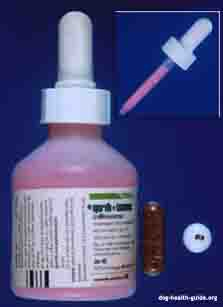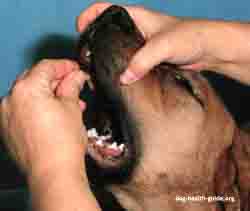Table of Contents
Overview | Allergy | Analgesics (Pain) | Antiseptics | Arthritis | Constipation
Cough | Diarrhea | Motion Sickness | Skin & Coat | Worms | Vet Questions
Summary:
"Many common canine ailments such as pain, vomiting, and arthritis can be treated with dog medicine found in the home. Many human products are "dog safe" if used as directed by a veterinarian or according to the label of the medication. Know that human medications are not approved for use in pets, but are often safe if used properly. Do not provide to your dog without consulting a veterinarian first. Dogs with other health issues will need to adjust the levels described below."

Pill, Or Capsule Form
Overview
It goes without saying that before you give your pet any dog medicine, you should check with your Veterinarian. The Dog Health Guide provides general information on prescription and over the counter dog medicine. This information is not intended to replace the advice of a Veterinarian or other pet health professional. Always tell your veterinarian and veterinary pharmacist what other medications your dog is taking. In addition, always be aware of poisoning from human over-the-counter drugs.
For reference:
- 1 teaspoon = 5 ml
- 1 pound = 0.453 kg
We suggest that if you have a specific question regarding your dog and dog medicine, leave a question for our veterinarian using the form at the bottom of this page. If you need an immediate response, we suggest using this online veterinarian answer service that has Vets standing by 24 hours a day to answer questions for a small fee.
Allergy Medicine: Antihistamines and Homeopathic Remedies
Benedryl (diphenhydramine)
- Dosage: 2 mg per pound of body weight orally every eight hours
- Side Effects: The side effects of hydroxyzine and diphenhydramine (common anti-allergic) may include sleepiness and sedation, lack of coordination, weakness, nausea and heightened thirst.
Precautions: Do not use if your dog is allergic to antihistamines. Use with caution in dogs with heart disease, glaucoma, urinary obstruction or intestinal obstruction. Do not use in pregnant or nursing dogs . Seek the advice of a veterinarian if using with with other CNS depressant drugs such as acepromazine; monoamine oxidase inhibitors (MAOIs) such as selegilene and Preventic collars; anticholinergics such as atropine and metoclopramide; and medications used for wheezing such as theophylline, epinephrine or ephedrine.
Allergy Relief Biscuits (K9 Cookie Crunch) and Allergy Itch Ease
K9 Cookie Crunch is a natural dog treat formulated to assist with allergies and skin irritation. It is made with human-grade ingredients and will help to support the skin. The same manufacture produces Allergy Itch Ease, a natural combination of ingredients formulated to prevent dog allergy related itch. Learn more.
Sinus Relief:
Sinu-Rite
Dogs like people suffer from sinusitis symptoms such as nasal discharge, nasal congestion and inflammation. There are homeopathic remedies available that use non-addictive ingredients in a tablet form that can be sprinkled on the dog's tongue or taken whole. The products work by using natural ingredients that help to strengthen the immune system and the body's natural ability to fight this problem. It has the added benefit of helping to prevent or reduce the frequency of sinus infections, and temporarily provide relief in congestion and sinus blockages. Products like Sinu-Rite are worth a try.
Antiseptics
Betadine Solution
- Dosage: Apply dog medicine on skin - dilute to 0.2 percent (2 ml to 2 quarts of tap water). Apply topically. Used for cleaning wounds.
Chlorhexidine Solution (Nolvasan)
- Dosage: Dilute to .05% (25 ml to 2 quarts, 1.9 to 1, tap water). Apply to skin to clean wounds.
Arthritis and Pain Medicine: Analgesics and Anti-Inflammatory Medications
Dog pain medications range from over the counter to prescription medications. The goal of dog medicine in pain management, such as when managing canine Osteoarthritis (OA) is to reduce clinical signs, slow the progression of the disease, and to improve the comfort of the patient.
NSAIDs
Aspirin
Aspirin (coated
and/or buffered) is an anti-inflammatory and analgesic, given with food:
- Dosage: 5 mg per pound orally every 12 hours. Works out to 1 adult
tablet/60 lbs with food, 2-3 times/day. If it isn't helping, see your
veterinarian. Most pet stores sell aspirin made for dogs or you can buy it
online from Amazon.com.
- Side Effects: Possible side effects include vomiting and
diarrhea. If you see either side effect do not use and call your
veterinarian.
- Precautions: Do not use if your dog is allergic to aspirin or or other NSAIDs or is suffering with a condition where thinning of blood can result in severe complications. If symptoms last more than 3 days, stop use and call your veterinarian.
Acetaminophen (Tylenol)
NEVER give your dog Tylenol/acetaminophen since it is toxic to the liver. Do not use it as a dog medicine unless under the direction of a veterinarian. Acetaminophen toxicosis can happen in 4 - 12 hours of intake and is characterized with tachypnea (abnormally rapid breathing), dyspnea (shortness of breath) and progressive cyanosis (bluish discoloration of skin) which may end the dog in coma.
Ibuprofen (Nuprin, Motrin, Advil)
Ibuprofen is very toxic and fatal to dogs at low doses such as 1 human tablet. Only aspirin is safe for dogs, and buffered aspirin or ascriptin is preferred to minimize stomach upset. Ibuprofen and acetaminophen when prescribed under the direction of a veterinarian for dogs is in minuscule dosages (Acetaminophen at 15 mg/kg and Ibuprofen at 10 mg/kg to avoid liver and kidney damage. It is strongly recommended to not administer ibuprofen and/or acetaminophen at home and should only be done in supervision of qualified staff at clinic.
Natural Medications
There are natural agents called DMOAs or Disease-Modifying Osteoarthritis Agents that help dogs with osteoarthritis by improve the function of bone cartilage or fluid (synovial fluid, a fluid that lubricates the joints). These products include glucosamine (a substance that is naturally found in a dog's body) and Chondroitin sulfate (CS). Studies are inconsistent, with some showing improvement in relieving some arthritis symptoms in humans. Both are found in dog foods that promote joint health, although there are no studies that support their use at levels in food. There are also other ingredients that have some support for use.
Muscle and Joint
Natural products such as Devil's claw, Spirulina, Lecithin, Glucosamine sulphate, Calc fluor (6C), Nat phos (6C) and Nat sulphuricum (6C) all have properties that when combined provide natural support for dog joint and muscle movement. Glucosamine sulphate in particular is supported by multiple clinical studies and is approved in 70 countries as being used for strengthening of cartilage. Muscle and Joint combines all of these ingredients in one affordable supplement.
Kratom based products are being explored for pain relief. Since there isn't research on authentic Kratom strains for use in dogs, consult with your veterinarian before buying kratom in bulk, or using this or any other "natural" or herbal product.
Prescription Medications
There are several pharmacological types of dog pain medicine. These include:
NSAIDs: Anti inflammatory properties, reduces fever, analgesic effect
There are 6 approved anti-inflammatory and non steroidal medications (NSAIDs) for use in Osteoarthritic dogs. Clinical support for these medications are based on clinical studies that measured relief over a time period ranging from 7 to 60 days. Each dog medicine can cause side effects such as kidney, liver, blood cell creation (hematopoietic systems) and gastrointestinal problems.
Medications/Types (approved by the FDA for dogs):
- Carprofen (Remadyl®) - side effects in Black Labs, fewer side effects in other dogs overall
- Deracoxib (Deramaxx®) - Dogs with renal disease may need dose adjustment
- Etodolac (Etogesic®) - 1x daily administration
- Meloxicam (Metacam®) - liquid and well tolerated in dogs
- Firocoxib (Previcox®)
The Following Are Not approved in the U.S. for use with dogs:
- Flunixin (Banamine®) - some gastrointestinal side effects common
- Ketoprofen (Ketoprofen®) - not licensed for dogs in U.S., approved for dogs in Europe and Canada, injectable
- Phenylbutazone (Cox 1 and 2 inhibitor, not recommended in dogs)
- Tepoxalin (Zubrin®) - The drug still has FDA approval but it cannot be sold and/or administered in US and Europe
Side Effects:
- Gastrointestinal upset (vomiting, diarrhea, ulcers, stomach upset)
- Kidney toxicity
- Impaired platelet function
Opioids: Effective sedative and for pain relief
Morphine
General Dog Opiod Side Effects:
- Respiratory problems (effects the cough center)
- Gastrointestinal problems (vomiting, defecation followed by constipation)
- Excitabiity (panting, vocalization, noise sensitivity)
Steroids: decreases dog pain by decreasing inflammation.
Medications/Types:
- Predinsone
- Dexamethasone
- Betamethasone
- Solu-Delta-Cortef
- Solu-Medrol
Side Effects:
- Polyphagia (excessive eating)
- Cataracts and Glaucoma
- Gastric Ulcers
- Delayed wound healing
- Hyperadrenocorticism (Cushings)
- Insulin Resistance
- Liver disease (Hepatopahty)
- Restlessness
- Infection
Local anesthetics
Medications/Types:
- Lidocaine
- Bupivicaine
- Mepivicaine
- Proparicaine
- Tetracaine
Chondroprotective drugs
Medications/Types:
- Synovi (oral)
- Glycoflex Adequan
- Oxymorphone
- Meperidine
- Hydromorphone
- Fentanyl (available in a patch, lasts for 3 days, side effects if used in excessive amounts)
- Buprenorphine - Buprenex®
- Butorphanol
- Naloxone - used to reverse effects of opiods/opiates

Alpha-2 Agonists
Alpha-2 Agonists work by decreasing nervous system sensitivity in area, referred to as thiazines. They are a potent sedative and a good muscle relaxant.
Medications/Types:
- Xylazine - Rompun®
- Medetomidine - Domitor®,
- Xylazine
Side Effects:
- Slow heartbeat (Bradycardia)
- Cardiac disturbances
- Vomiting
Cough Remedies: Suppressants and Expectorants
Expectorant (to help with mucus):
Robitussin Maximum
Strength Cough Syrup
- Dosage: 1 teaspoon per 20 pounds orally every 4 hours as needed or prescribed.
- Caution: Check the label to make sure the medicine does not contain ibuprofen or acetaminophen. Look for products containing Guaifenesin and/or Dextromethorphan
Suppressant:
Robitussin Dm, Benylin Expectorant (destromethorphan) or Siltussin DM (Silarx)
Look for products
containing Guaifenesin (100mg) and Dextromethorphan. While these products are not approved
for veterinary use by the FDA they are common practice in the
veterinary community.
- Dosage: (10mg) per teaspoonful..5 to 1 mg per pound (or 1 teaspoon
per 20 pounds) orally every 6 hours. The dose for Robitussin DM in
small dogs is 1/2 teaspoon every 4 hours. The usual dose in large dogs
is 1 teaspoonful every 4 hours.
- Side effects: Number 1 side effect is sleepiness. If your dog
shows other symptoms such as dry heaves and shows changes in behavior
such as lethargic behavior, take your dog to the Emergency Room or
veterinarian as soon as possible.
- Precautions: Do not use these products with an MAO inhibitor such
as Anipryl (selegiline) or Preventic Tick Collar.
Respo-K
Respo-K is a homeopathic remedy formulate to relieve symptom such as cold, watery eyes and sneezing. It decreases recovery time from respiratory infections and helps to prevent colds by strengthening a dog's immune system. It works by combining ingredients such as Calc sulph, and Verbascum to support natural breathing.

Digestive System Medications
Antacids:
Milk of Magnesia (magnesium hyroxide) - Mylanta - Maalox (magnesium hydroxide):
- Dosage: 2 to 5 ml per pound orally every 4 to 6 hours (antacid)
or 7 to 25 ml. per pound orally once only (laxative)
Pepcid (famitodine):
- Dosage: 1 mg per pound of body weight. Oral or injected. 1x or 2x per day.
Prilosec
(omeprazole):
- Dosage: .25 to .5 mg per pound of body weight. Taken orally 1x per day.
Zantac (rantidine):
- Dosage: 150 mg to 300 mg per pound of body weight. Taken with food. Provide daily, divide dose over several meals given throughout the day.
Tagamet (cimetidine):
- Dosage: 10 mg per pound of body weight, taken orally 2x to 3x per day
Constipation:
Metamucil (psyllium):
- Dosage: 1 teaspoon per 11 to 22 pounds of body weight. Add to dog food. Provide 1x per day, only for short term use unless advised by a veterinarian
Natural Moves for Pets:
- Natural Moves for pets promotes a healthy digestive system and promotes regular bowel movements. It contains Psyllium husk, oat straw and cape aloe for their beneficial effects on dog digestive health.
Dog Diarrhea Medicine:
See our guide to dog diarrhea medicine. It's best to check a stool sample for parasites first. If there is no vomiting, try a bland diet of broiled or boiled hamburger or chicken and rice for a few days. You can also use kaopectate, Pepto Bismol, and on large dogs, Imodium (2mg/60-80lbs). If there is vomiting or blood in the stool, it's better to take your dog to the veterinarian.
Kaopectate:
- Dosage: 1 ml per pound (or 1 to 2 teaspoons per 10 pounds) every 4 hours
Pepto-Bismol (bismuth subsalicylate),
Kaopectate:
- Dosage: .5 to 1.5 ml per pound of body weight orally every 12 hours
Kaolin
and Pectin (caution do not use formulations that contain
salicylates) - for persistent diarrhea:
- Dosage: 1/2 to 1 ml per pound of body weight (1 to 2 teaspoons per 10 pounds of body weight). Taken orally every 6 hours.
For Regular Bowel Movements:
Digestive
Support:
Many dogs have trouble maintaining bowel, digestive health and cholesterol in a normal range. In nature, wild dogs would achieve balance by seeking out those foods and remedies by instinct. In captivity, dogs may need a little help from products formulated to replicate this outdoor experience. Ingredients such as Licorice and Marshmallow (Altheaea officinalis) are known for their ability to remedy digestive health.
- Products to consider include Digestive Support.
Laxative:
Mineral Oil:
- Dosage: 10 to 50 ml. per dog, add to food
Poison Removal:
Charcoal (compressed activated charcoal):
- Dosage: 1.5 gm tablet per 10 pounds, keep at least 30 tablets available.
Dog Vomit Treatment
Dog vomit
problems can be due to parasites, infectious diseases, foreign bodies,
tumors
and inflammation. The most common reason is when a foreign body or
something else that shouldn't have been eaten is digested. If vomiting
is occasional and the dog is acting normally, try no food or water for
several hours. Once vomiting has stopped, provide and small amounts of
water at a time or an ice cube. Click link for more information
and
bland diet options.
You can also try Kaopectate or Pepto bismal at 1 Tbsp/30 lbs 3-4 times. If the vomiting continues, see your veterinarian.
How to make a Dog Vomit:
Only make your dog vomit if what was
swallowed is not caustic (acidic)
or sharp (i.e.tennis ball, chocolate) and if swallowed within a half
hour.
Hydrogen Peroxide (3%):
- Dosage: 1 teaspoon per 10 pounds orally, may repeat every 15 to 30 minutes (3 times only). 1/4 to 1/2 cup depending on size of dog.

Motion Sickness:
Dramamine (dimenhydrinate):
- Dosage: 2 to 4 mg per pound orally every eight hours
Skin and Coat
Skin and Coat Tonic:
There is an exhaustive list of ailments that can result in skin and coat problems. One approach is to add a supplement to your dog's diet that is formulated to improve coat and skin appearance. Natural ingredients such as Bladderwrack, Dandelion, Horsetail, Kali sulph, Lactose and Spirulina have various levels of clinical support for their effectiveness. See Skin and Coat Tonic for details, additional information on ingredients and descriptions of clinical support behind each ingredient.
Worms
Before treating dog worms, it is important to identify the type of worm that is the source of the problem. See our guide to dog worms for pictures and details.
Over the Counter Medications
A dog medicine for worms is specific to the type of worm your dog has. Popular dog medicine options include:
- Safe-Guard:
This product is for the control and treatment of roundworms, tapeworms,
hookworms and whipworms.
It is puppy safe over age 6 weeks, heartworm infected dogs and pregnant
female dogs. The product mixes into food and is provided for 3
consecutive days.
- Panacur
(fenbendazole): Can be mixed with the dog's usual food to treat
tapeworms, hookworms, roundworms and whipworms. The usual dose for dogs is one packet, based on weight, 1x a day for 3
consecutive days.
- Tapeworm
Tabs: Tapeworms are long thin white worms found at the dog's
anus.
Tapeworm tabs are specifically formulated to kill this type of dog
worm.
It is the only over the counter product that contains praziquantel as
the active ingredient.
- Evict: Evict is a FDA approved dog worm medicine that removes large roundworms and hookworms from puppies and dogs. Importantly, the product also prevents re-infestation
Natural Approach
- This product is a natural alternative to the aforementioned dewormers. It contains multiple ingredients known to help dogs naturally expel parasites such as tapeworm, heartworm and roundworm.
Prescription Medications:(1)
- Epsiprantel (Oral-Local)
- Macrocyclic Lactones (Systemic)
- Melarsomine (Systemic)
- Tetrahydropyrimidines (Oral-Local)
Ask a Question or Share Your Story
Have A Dog Medicine Question For Our Editors?
Do you have a Dog Medicine related question for our Editors or a Helpful Story to Share? Please include information such as medical history (describe visits to vet and any diagnosis/test results), age, sex, breed, medications your dog is taking, recent changes in behavior (lethargy, appetite), etc.
We will do our best to get back to you quickly (depends on how many questions we receive each day). If you do require an immediate response we suggest using this online dog veterinary service that is available now.
What Other Visitors Have Asked and Suggested
Click below to see contributions from other visitors to this page...
Painkiller for Arthritic Dog Not rated yet
Reader Question
Hi,
I have a 7 year old GSD bitch weighing in at 33.6kgs. She went for a vet check last week and they confirmed that she has some …
References for Dog Medicine
(1) American Academy of Veterinary Pharmacology and Therapeutics
(2) Giving Oral Medications to Dogs, Washington State University College of Veterinary Medicine
Canine First Aid Workshop
August 8, 1999, Standish, Maine
Presented by VMD Eve Knowles
The Hound Health Book
Betsy Brevitz, DVM
Pain Management for Canine Osteoarthritis
P. Roudebush
Hill’s Pet Nutrition, Inc., Topeka, KS, USA.
Merck Veterinary Resources: Drugs Calculator
